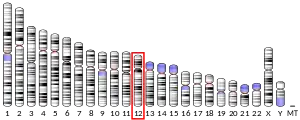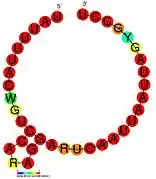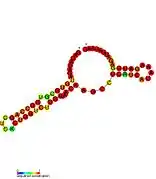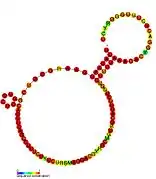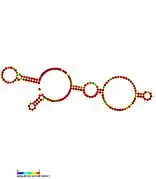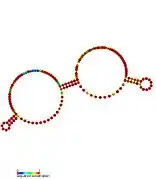| HOTAIR | |||||||||||||||||||||||||||||||||||||||||||||||||||
|---|---|---|---|---|---|---|---|---|---|---|---|---|---|---|---|---|---|---|---|---|---|---|---|---|---|---|---|---|---|---|---|---|---|---|---|---|---|---|---|---|---|---|---|---|---|---|---|---|---|---|---|
| Identifiers | |||||||||||||||||||||||||||||||||||||||||||||||||||
| Aliases | HOTAIR, HOXAS, HOXC-AS4, HOXC11-AS1, NCRNA00072, HOX transcript antisense RNA, HOTAIR long untranslated RNA, human | ||||||||||||||||||||||||||||||||||||||||||||||||||
| External IDs | OMIM: 611400 GeneCards: HOTAIR | ||||||||||||||||||||||||||||||||||||||||||||||||||
| |||||||||||||||||||||||||||||||||||||||||||||||||||
| |||||||||||||||||||||||||||||||||||||||||||||||||||
| |||||||||||||||||||||||||||||||||||||||||||||||||||
| Wikidata | |||||||||||||||||||||||||||||||||||||||||||||||||||
| |||||||||||||||||||||||||||||||||||||||||||||||||||
HOTAIR (for HOX transcript antisense RNA)[3] is a human gene located between HOXC11 and HOXC12 on chromosome 12. It is the first example of an RNA expressed on one chromosome that has been found to influence transcription of HOXD cluster posterior genes located on chromosome 2. The sequence and function of HOTAIR is different in human and mouse.[4] Sequence analysis of HOTAIR revealed that it exists in mammals, has poorly conserved sequences and considerably conserved structures, and has evolved faster than nearby HoxC genes.[5] A subsequent study identified HOTAIR has 32 nucleotide long conserved noncoding element (CNE) that has a paralogous copy in HOXD cluster region (located between HOXD11 and HOXD12),[6] suggesting that the HOTAIR conserved sequences predates whole genome duplication events at the root of vertebrate. While the conserved sequence paralogous with HOXD cluster is 32 nucleotide long, the HOTAIR sequence conserved from human to fish is about 200 nucleotide long and is marked by active enhancer features (bidirectional transcription, H3K4me1 and H3K27ac peaks).[6]
Gene and transcribed RNA product
The HOTAIR gene contains 6,232 bp and encodes 2.2 kb long noncoding RNA molecule, which controls gene expression. Its source DNA is located within a HOXC gene cluster. It is shuttled from chromosome 12 to chromosome 2 by the Suz-Twelve protein.[7]
Function
The 5′ end of HOTAIR interacts with a Polycomb-group protein Polycomb Repressive Complex 2 (PRC2) and as a result regulates chromatin state. It is required for gene-silencing of the HOXD locus by PRC2.[8][9] PRC2 is dispensable for HOTAIR-mediated transcriptional silencing.[10] The 3′ end of HOTAIR interacts with the histone demethylase LSD1.[9]
It is an important factor in the epigenetic differentiation of skin over the surface of the body. Skin from various anatomical positions is distinct, e.g. the skin of the eyelid differs markedly from that on the sole of the foot.[8][11]
Clinical significance
HOTAIR is highly expressed in metastatic breast cancers. High levels of expression in primary breast tumours are a significant predictor of subsequent metastasis and death. This is partially due to HOTAIR-mediated overexpression of the HER2 oncogene through sequestration of miR-331-3p, which is a negative regulator of HER2 expression.[12] In cells, especially those that over express PRC2, the prevention of HOTAIR expression leads to a reduction in invasive potential of that cell.[13] It is also involved in esophageal squamous cell carcinoma.[14]
References
- 1 2 3 GRCh38: Ensembl release 89: ENSG00000228630 - Ensembl, May 2017
- ↑ "Human PubMed Reference:". National Center for Biotechnology Information, U.S. National Library of Medicine.
- ↑ "Genecards entry on HOTAIR". Retrieved 20 July 2010.
- ↑ Schorderet P, Duboule D (May 2011). "Structural and functional differences in the long non-coding RNA hotair in mouse and human". PLOS Genetics. 7 (5): e1002071. doi:10.1371/journal.pgen.1002071. PMC 3102750. PMID 21637793.
- ↑ He S, Liu S, Zhu H (April 2011). "The sequence, structure and evolutionary features of HOTAIR in mammals". BMC Evolutionary Biology. 11 (1): 102. Bibcode:2011BMCEE..11..102H. doi:10.1186/1471-2148-11-102. PMC 3103462. PMID 21496275.
- 1 2 Nepal C, Taranta A, Hadzhiev Y, Pundhir S, Mydel P, Lenhard B, et al. (April 2020). "Ancestrally Duplicated Conserved Noncoding Element Suggests Dual Regulatory Roles of HOTAIR in cis and trans". iScience. 23 (4): 101008. Bibcode:2020iSci...23j1008N. doi:10.1016/j.isci.2020.101008. PMC 7139118. PMID 32268280.
- ↑ Petherick A (August 2008). "Genetics: The production line". Nature. 454 (7208): 1042–5. doi:10.1038/4541042a. PMID 18756228.
- 1 2 Rinn JL, Kertesz M, Wang JK, Squazzo SL, Xu X, Brugmann SA, et al. (June 2007). "Functional demarcation of active and silent chromatin domains in human HOX loci by noncoding RNAs". Cell. 129 (7): 1311–23. doi:10.1016/j.cell.2007.05.022. PMC 2084369. PMID 17604720.
- 1 2 Tsai MC, Manor O, Wan Y, Mosammaparast N, Wang JK, Lan F, et al. (August 2010). "Long noncoding RNA as modular scaffold of histone modification complexes". Science. 329 (5992): 689–93. Bibcode:2010Sci...329..689T. doi:10.1126/science.1192002. PMC 2967777. PMID 20616235.
- ↑ Portoso M, Ragazzini R, Brenčič Ž, Moiani A, Michaud A, Vassilev I, et al. (April 2017). "PRC2 is dispensable for HOTAIR-mediated transcriptional repression". The EMBO Journal. 36 (8): 981–994. doi:10.15252/embj.201695335. PMC 5391141. PMID 28167697.
- ↑ Chuong CM (January 2003). "Homeobox genes, fetal wound healing, and skin regional specificity". The Journal of Investigative Dermatology. 120 (1): 9–11. doi:10.1046/j.1523-1747.2003.00002.x. PMC 4383243. PMID 12535191.
- ↑ Liu XH, Sun M, Nie FQ, Ge YB, Zhang EB, Yin DD, et al. (April 2014). "Lnc RNA HOTAIR functions as a competing endogenous RNA to regulate HER2 expression by sponging miR-331-3p in gastric cancer". Molecular Cancer. 13: 92. doi:10.1186/1476-4598-13-92. PMC 4021402. PMID 24775712.
- ↑ Gupta RA, Shah N, Wang KC, Kim J, Horlings HM, Wong DJ, et al. (April 2010). "Long non-coding RNA HOTAIR reprograms chromatin state to promote cancer metastasis". Nature. 464 (7291): 1071–6. Bibcode:2010Natur.464.1071G. doi:10.1038/nature08975. PMC 3049919. PMID 20393566.
- ↑ Chen FJ, Sun M, Li SQ, Wu QQ, Ji L, Liu ZL, et al. (November 2013). "Upregulation of the long non-coding RNA HOTAIR promotes esophageal squamous cell carcinoma metastasis and poor prognosis". Molecular Carcinogenesis. 52 (11): 908–15. doi:10.1002/mc.21944. PMID 24151120. S2CID 12457373.
Further reading
- Woo CJ, Kingston RE (June 2007). "HOTAIR lifts noncoding RNAs to new levels". Cell. 129 (7): 1257–9. doi:10.1016/j.cell.2007.06.014. PMID 17604716. S2CID 18124576.
- Khalil AM, Guttman M, Huarte M, Garber M, Raj A, Rivea Morales D, et al. (July 2009). "Many human large intergenic noncoding RNAs associate with chromatin-modifying complexes and affect gene expression". Proceedings of the National Academy of Sciences of the United States of America. 106 (28): 11667–72. Bibcode:2009PNAS..10611667K. doi:10.1073/pnas.0904715106. PMC 2704857. PMID 19571010.
- Wan Y, Chang HY (September 2010). "HOTAIR: Flight of noncoding RNAs in cancer metastasis". Cell Cycle. 9 (17): 3391–2. doi:10.4161/cc.9.17.13122. PMC 3066151. PMID 20864820.
- Hung T, Chang HY (September 2010). "Long noncoding RNA in genome regulation: prospects and mechanisms". RNA Biology. 7 (5): 582–5. doi:10.4161/rna.7.5.13216. PMC 3073254. PMID 20930520.
- Kaneko S, Li G, Son J, Xu CF, Margueron R, Neubert TA, Reinberg D (December 2010). "Phosphorylation of the PRC2 component Ezh2 is cell cycle-regulated and up-regulates its binding to ncRNA". Genes & Development. 24 (23): 2615–20. doi:10.1101/gad.1983810. PMC 2994035. PMID 21123648.
- Sun L, Fang J (January 2011). "Writer meets eraser in HOTAIR". Acta Biochimica et Biophysica Sinica. 43 (1): 1–3. doi:10.1093/abbs/gmq110. PMID 21138898.
- Yang Z, Zhou L, Wu LM, Lai MC, Xie HY, Zhang F, Zheng SS (May 2011). "Overexpression of long non-coding RNA HOTAIR predicts tumor recurrence in hepatocellular carcinoma patients following liver transplantation". Annals of Surgical Oncology. 18 (5): 1243–50. doi:10.1245/s10434-011-1581-y. PMID 21327457. S2CID 21457941.
- Nie Y, Liu X, Qu S, Song E, Zou H, Gong C (April 2013). "Long non-coding RNA HOTAIR is an independent prognostic marker for nasopharyngeal carcinoma progression and survival". Cancer Science. 104 (4): 458–64. doi:10.1111/cas.12092. PMC 7657223. PMID 23281836. S2CID 207103684.
External links
- Page for HOTAIR conserved region 1 at Rfam
- Page for HOTAIR conserved region 2 at Rfam
- Page for HOTAIR conserved region 3 at Rfam
- Page for HOTAIR intron conserved region 4 at Rfam
- Page for HOTAIR intron conserved region 5 at Rfam
